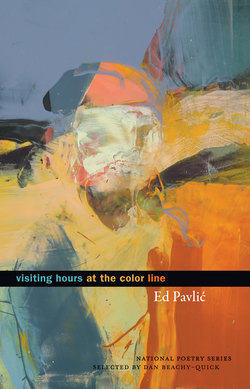Читать книгу Visiting Hours at the Color Line - Ed Pavlic - Страница 12
На сайте Литреса книга снята с продажи.
ОглавлениеVerbatim
By the time the second tower fell the Humanities lounge had filled up with staff and professors and students. I stood there and stared into the dust on TV. I was suddenly conscious that I’d spent years coaxing what I saw and heard, charting it as it traveled oxbow routes thru me. The dust disappeared the building. As I went thru the doorway, Bill said, “It’s gone.” I left the lounge and walked cross campus, the upstate sky unbroken blue. Kids on the library steps weeping in groups. I’d had a recurring dream where the students and faculty of the college paraded between classes holding their brains in glass jars, suspended in clear fluid. My thought then, “I guess neither approach is much good.” Jackson Garden is back behind the Campus Center. I walk thru the stone gates feeling the towers and the dust and the broken glass of bodies pulse in my arms and legs where I’d coaxed the world to go. I see Thanha Nguyen, an exchange fellow in Modern Languages. When we met she’d told me that she grew up in Hanoi during the American War.
Last Spring, we read Dien Cai Dau in my seminar. I’d invited Ms. Nguyen to attend the class. I bought her a copy of the book and got Yusef to sign it for her. Her English wasn’t great. She said it was hard for her to read in English when she missed her children like she did. I asked. A boy and a girl, 9 and 13. She read the book and came to class. She didn’t say much. She turned to the poem “Tunnels” and told us that her school had been moved to a village outside Hanoi because of the bombings and that, for the first term, the teachers had worked with the students to dig tunnels like the ones in the poem. They were told to hide in the tunnels when they heard the sirens from the city. She said, after a few weeks, the tunnels filled with water and rats lived in them and none of the students would go in. Instead, they stood there around the opening to the tunnel listening to the sirens wishing the rain would stop. That’s what she said. And, she turned to the poem “Prisoners” and asked if this writer was for or against the war. She asked why he wanted to bow to the enemy. I explained that the book’s not really about enemies. It’s about kinds of power and how they interact. Military, cultural, ancestral, erotic, psychological, masculine, feminine. I could tell she wasn’t really listening. I pictured her standing in the rain. I stopped. She said, why did he want to bow to the enemy?
By the time I entered the garden I’d concluded that only a real fool would coax this fucking world into his body like I have. Naïve. My legs feel like they were sketched in pencil and then, mistaken, worked over with a wide eraser. I walk up to Ms. Nguyen and say hello. I can’t decide if the burnt rubber smell is from the city or the scatter of tiny, hot twirls of the eraser burning my legs. She’s staring into flowerbeds that bristle and hum with bees in the perfect sun. She : how are you? I ask if she’d heard. Heard? I say terrorists attacked New York City. Terrible. Could be ten thousand dead. No one knows. Ms. Nguyen’s eyes turn to mine, she hands me her camera, “Would you take my photo with these flowers?”
